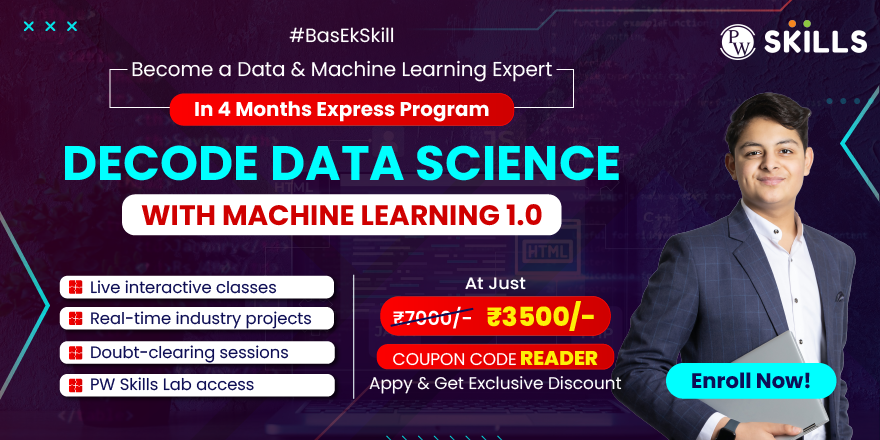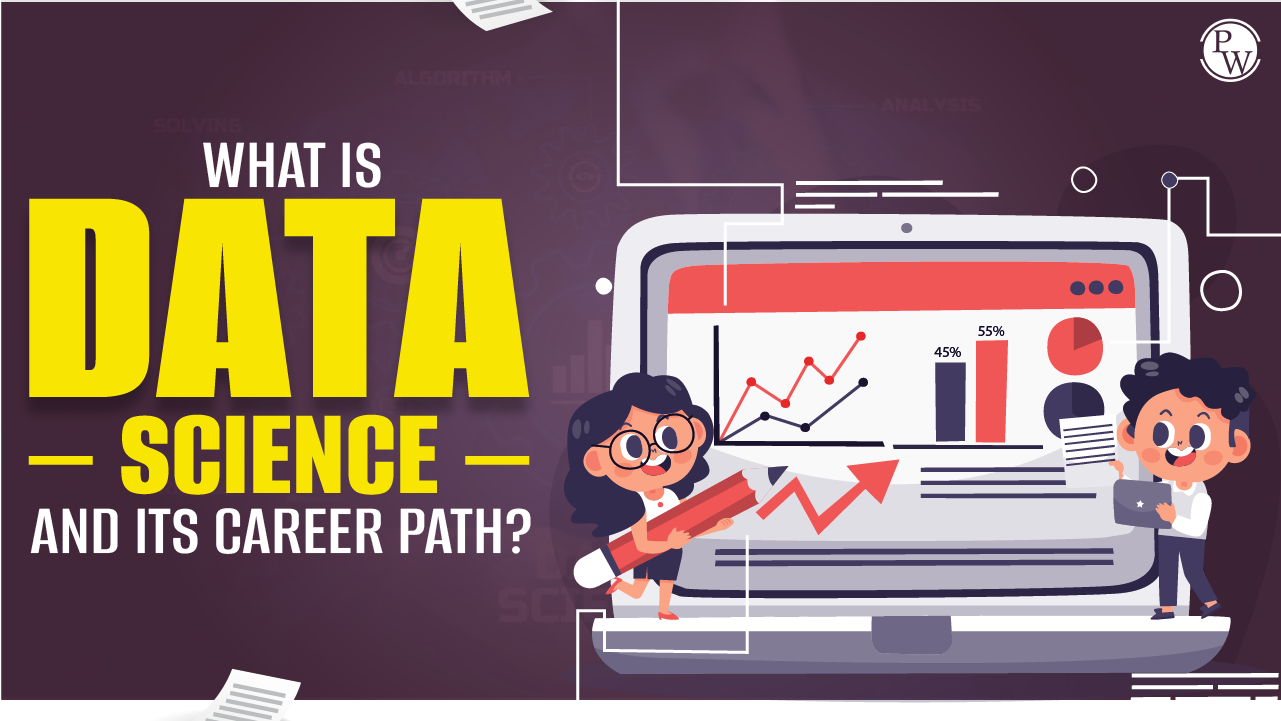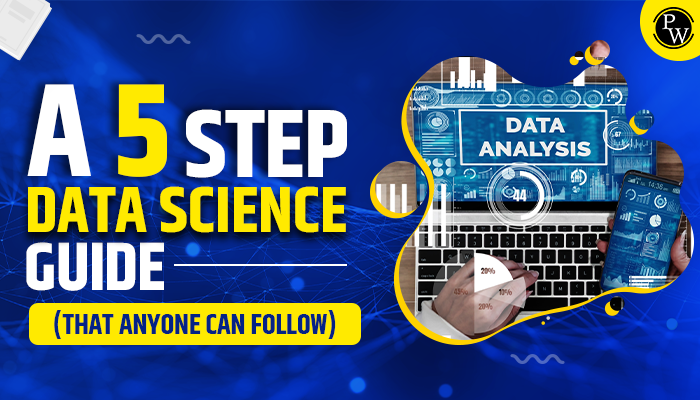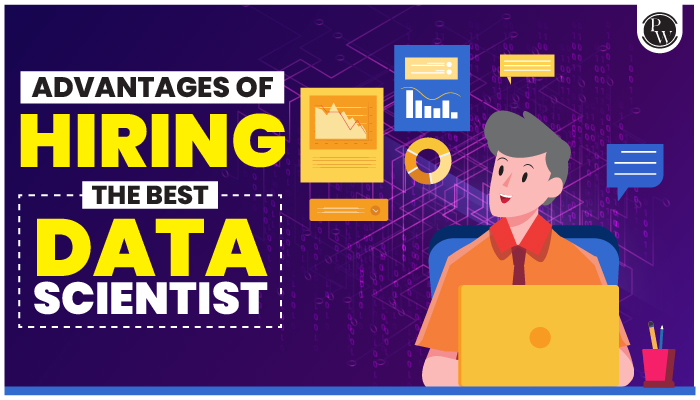Data Science Career Path: Data Science has emerged as a transformative force in the world of technology and business, with India playing a pivotal role in its growth and adoption. It combines maths, computer science, and domain knowledge to extract insights from vast data, fostering innovation and informed decision-making.
As India remains a technology and analytics hub, understanding the data science career path in an Indian context is vital. Additionally, if you want to make a career in data science, a Full Stack Data Science Course is highly recommended. In this blog, we’ll talk about the Data Science Career Path in 2023, and how you can embark on this exciting journey.

Data Science Career Path for Data Scientists
A data science career path typically consists of several stages. It’s important to understand these stages to plan your career effectively.
I. Entry-Level Data Science Roles
At the entry-level, aspiring data scientists often start as:
-
Data Analysts
- Job Roles: Data analysts hold a pivotal position in data-informed decision-making. Their duties encompass gathering, scrubbing, and presenting data, often employing tools like Excel, SQL, and fundamental statistical analysis.
- Qualifications and Skills: Typically, a bachelor’s degree in a related discipline like mathematics, statistics, or computer science is a prerequisite. Proficiency in data analysis tools and elementary programming languages can be advantageous.
- Tips: To land an entry-level data analyst position, focus on developing strong analytical and communication skills. Build a portfolio of data analysis projects and gain proficiency in tools like Excel and SQL.
-
Junior Data Scientists
- Job Roles: Junior data scientists move beyond basic data analysis and start to assist in data collection, analysis, and model development. They may also work on feature engineering and building simple predictive models.
- Qualifications and Skills: Typically, a bachelor’s or master’s degree in data science, machine learning, or a related field is standard. Mastery of programming languages like Python or R is essential.
- Tips: To transition from being a data analyst to becoming a junior data scientist, concentrate on constructing a robust project portfolio with real-world data, showcasing your capacity to employ statistical and machine learning techniques effectively.
Also read: What is Data Analytics? A Complete Guide for Beginners
II. Mid-Level Data Science Roles
As you gain experience, you can transition to mid-level positions, such as:
-
Data Scientists
- Job Role: They develop predictive models, craft data-driven solutions, and convey stakeholder insights. They tackle intricate projects, frequently utilising machine learning and statistical modelling.
- Qualifications and Skills: Most data scientists possess a master’s degree in data science, machine learning, or a related discipline. They demonstrate proficiency in advanced programming and a profound comprehension of machine learning algorithms and frameworks.
- Skill Development: To excel in the role of a data scientist, prioritise advanced machine learning, delve into deep learning, and explore big data technologies. Continuously stay informed about the most recent research and methodologies in the field.
-
Machine Learning Engineers
- Job Roles: Machine learning engineers focus on the deployment and optimization of machine learning models in production. They work closely with data scientists to take models from development to implementation.
- Qualifications and Skills: Strong programming skills are essential, with expertise in machine learning libraries and frameworks. Knowledge of DevOps practices is valuable.
- Skill Development: To excel as a machine learning engineer, master model deployment, containerization, orchestration, and the automation of machine learning workflows.
III. Senior-Level Data Science Roles
At the senior level, you take on leadership roles and greater responsibilities:
-
Lead Data Scientist
- Job Roles: Lead data scientists oversee and guide data science teams. They set the strategic direction of data projects, manage complex projects, and ensure that the team is working effectively and efficiently.
- Qualifications and Skills: Extensive experience is key, along with strong leadership skills and advanced domain knowledge.
- Skill Development: Focus on leadership and project management skills. Develop a deep understanding of your business domain and align data science initiatives with the organisation’s strategic goals.
-
Chief Data Officer (CDO)
- Job Roles: Chief Data Officers are responsible for the overall data strategy of an organisation. They ensure that data is governed, protected, and used effectively to drive business success.
- Qualifications and Skills: CDOs typically have extensive experience, advanced degrees, and exceptional business acumen. Effective communication and collaboration skills are critical.
- Skill Development: Focus on developing a deep understanding of the business environment, industry regulations, and data governance best practices.
Data Scientist Education
A solid educational foundation is crucial for a successful career in data science:
-
Academic Qualifications
Starting in data science, computer science, statistics, or a related field is a common entry point for aspiring data scientists. The degree level varies depending on career objectives:
- Bachelor’s Degree: An undergraduate degree in data science or a related discipline equips individuals with fundamental insights into the field and facilitates access to entry-level roles.
- Master’s Degree: Many intermediate and senior data science positions mandate a master’s degree, enabling deeper comprehension and specialisation prospects.
- Doctoral Degree: Pursuing a Ph.D. in data science can be beneficial for those interested in research, academia, or highly specialised roles.
-
Online Courses and Bootcamps
Not everyone takes the traditional academic path. Online courses and bootcamps offer flexibility and accessibility for those looking to upskill or transition to data science:
- Platforms like PW Skills offer a wide range of data science courses, often taught by professors from top universities.
- Data science bootcamps offer intensive, hands-on training that can help you quickly gain practical skills.
It’s important to choose courses or bootcamps that align with your career goals and provide a recognized certification upon completion.
-
Importance of Specialisation
Data science is a broad field, and specialisation can set you apart in your career. Consider the following areas of specialisation:
- Data Engineering: Focusing on data engineering teaches you to construct and uphold data pipelines and infrastructure, vital in the data science ecosystem.
- Machine Learning: Dedicating yourself to machine learning enables you to delve into creating and deploying predictive models, a fundamental aspect of data science.
- Data Analytics: Focusing on data analytics can lead to roles where you analyse and visualise data, presenting actionable insights to stakeholders.
- Big Data: Specialising in big data technologies like Hadoop and Spark prepares you for roles that involve handling and analysing large volumes of data.
By understanding the educational options and the importance of specialisation, you can tailor your learning journey to align with your career objectives.
Also check: Benefits of Big Data Analytics
Data Scientist Certification
Certifications can complement your educational background and enhance your data science career:
-
Benefits of Certifications
- Validation of Skills: Certifications validate your proficiency in specific tools or areas of data science, making you more attractive to employers.
- Increased Job Prospects: Having relevant certifications can increase your job prospects and open doors to job interviews.
- Commitment to Professional Growth: Earning certifications demonstrates your commitment to professional development and staying current in the field.
-
Popular Data Science Certifications
Certified Data Scientist (CDS): Offered by the Data Science Council of America (DASCA), this certification covers various data science areas, including data analysis, machine learning, and data engineering.
- Microsoft Certified: Data Analyst Associate: Microsoft offers certifications that focus on data analysis using tools like Power BI and SQL.
- Google Professional Data Engineer: For those using Google Cloud Platform (GCP), this certification demonstrates your proficiency in data engineering and data analysis with GCP services.
- IBM Data Science Professional Certificate: Offered through Coursera, this program provides a series of courses covering data science and machine learning skills.
Data Scientist Skills
Data scientists require a diverse skill set that encompasses technical expertise and soft skills to excel in their roles. Here’s a more detailed breakdown of the skills required:
-
Core Technical Skills
Programming: Mastery of programming languages is essential for manipulating, analysing, and modelling data. Specifically, Python, R, and Julia see widespread use in data science.
- Machine Learning: A deep grasp of machine learning is vital. Data scientists must understand diverse algorithms and gain hands-on experience with frameworks like scikit-learn, TensorFlow, and PyTorch, encompassing supervised and unsupervised learning, as well as deep learning.
- Data Manipulation: Proficiency in data cleaning, preprocessing, and feature engineering is a must. Data scientists should excel at managing unstructured and noisy data, addressing missing values, and transforming data for analysis.
- Data Visualization: The capability to craft meaningful and informative data visualisations is indispensable. Tools such as Matplotlib, Seaborn, and Tableau are commonly employed to convey findings to both technical and non-technical audiences.
- Big Data Tools: Depending on the organisation and data scale, data scientists might need to employ big data technologies like Hadoop, Spark, and NoSQL databases. Proficiency in these tools proves valuable when handling extensive datasets.
- SQL and Databases: Knowledge of SQL is vital for querying relational databases. Data scientists should be comfortable working with databases to extract and manipulate data. Understanding the principles of database design and management is also beneficial.
-
Soft Skills and Business Acumen
- Communication: Effective communication is vital for data scientists. They must convey complex findings, technical ideas, and data-driven insights to various audiences, including those who lack technical knowledge. It’s essential to explain results clearly, concisely, and engagingly.
- Problem Solving: Data scientists are adept problem solvers. They possess strong critical thinking skills and the capacity to devise innovative solutions to real-world problems using data-driven methods.
- Business Acumen: A profound comprehension of the organisation’s business objectives, industry intricacies, and unique challenges is indispensable. Data science solutions should align with these objectives to provide real value.
- Teamwork: Data science projects often involve cross-functional teams, including data engineers, domain experts, and business leaders. Collaborative skills are vital for working effectively within such teams.
- Ethical Considerations: As data scientists handle sensitive and potentially biassed data, they should be aware of ethical considerations in data collection, analysis, and model deployment. Ensuring fairness and avoiding harmful consequences is increasingly important.
- Adaptability: Data science evolves rapidly with new tools, methods, and approaches emerging constantly. Data scientists must stay flexible, embrace learning, and keep pace with industry advancements.
- Time Management: Effective time management is crucial in data science, as projects often involve tight deadlines and the need to balance multiple tasks. Prioritising work efficiently is key to success.
- Domain Knowledge: Depending on the industry, data scientists may require domain-specific expertise. Understanding the specific challenges and nuances of the domain they work in can greatly enhance the effectiveness of data science solutions.
- Coding Best Practices: Writing clean, modular, and well-documented code is essential for collaboration and project maintainability. Data scientists should follow coding best practices to ensure their work is reproducible and easily understood by team members.
- Presentation Skills: Beyond creating data visualisations, data scientists should possess strong presentation skills to effectively convey their findings during meetings, conferences, and reports. This includes the ability to structure presentations and adapt them to the audience’s level of technical understanding.
Data Scientist Salaries
Salaries for data scientists in India vary based on a multitude of factors, including experience, location, industry, and role. Understanding these factors is crucial for planning your career.
-
Average Salaries
- Entry-Level: Entry-level data scientists can expect to earn between ₹6 to ₹10 lakh per annum, with variations based on location and other factors.
- Mid-Level: Mid-level data scientists, such as machine learning engineers, typically earn in the range of ₹10 to ₹20 lakh per annum.
- Senior-Level: Senior data scientists, lead data scientists, and CDOs can earn ₹20 lakh or more per annum, with some senior roles reaching ₹50 lakh or higher.
-
Factors Influencing Salaries
- Location: Salary ranges can vary significantly across cities in India. For example, Mumbai, Bangalore, and Delhi often offer higher salaries compared to other regions.
- Company Size and Industry: Tech companies and large corporations tend to offer higher salaries. Data scientists in industries like finance, e-commerce, and healthcare may also earn more.
- Experience and Specialization: Senior data scientists or those with specialised expertise often command higher salaries.
-
Salary Negotiation
- Research industry standards and salary ranges in your location and field.
- Emphasise your unique skills, experience, and contributions.
- Be prepared to negotiate, keeping in mind your market value and the company’s budget.
Job Outlook for Data Scientists
The future of data science in India looks promising:
-
Growth of the Field
Data science is vital for decision-making across industries. Growing data and the quest for data-driven insights promise industry growth. Artificial intelligence and machine learning adoption drive the need for data science experts.
-
Industry Sectors and Domains
The demand for data science spans sectors like finance, healthcare, retail, manufacturing, and agriculture. Opportunities go beyond technology.
Domain-specific expertise is becoming increasingly valuable. For example, data scientists with knowledge of the healthcare domain can leverage their skills to improve patient outcomes and streamline healthcare operations.
-
Future Trends
The field of data science is dynamic and continuously evolving. Staying informed about future trends can help you position yourself for success:
- The Rise of AI and Machine Learning: AI and machine learning are expected to play an even more significant role in data science, revolutionising the way businesses make decisions and automate processes.
- Ethical Considerations: As data collection and analysis become more pervasive, ethical considerations and responsible AI practices will gain importance.
- Data Engineering and Data Governance: Data engineering and governance will become more critical to ensure data quality, security, and compliance.
- Data Science in Emerging Technologies: Data science is expected to play a vital role in emerging technologies, such as autonomous vehicles, blockchain, and quantum computing.
By staying informed about the latest trends and developments in the field, you can position yourself for long-term success as a data scientist in India.
Conclusion
A career in data science in India offers a world of opportunities for those who are passionate about solving real-world problems with data. With the right education, skills, and determination, you can embark on a successful data science journey in India. Whether you’re just starting or looking to advance your career, the field of data science continues to offer exciting prospects.
Don’t wait any longer to start your career in data science. Enrol in the PW Skills Full Stack Data Science Pro Course today and learn everything you need to know to become a successful data scientist. With our comprehensive curriculum, hands-on experience, and job assurance program, you’ll be well on your way to your dream job. Enrol today and start your journey to becoming a data scientist in demand!
Data Science Career Path FAQs
What is the role of domain expertise in data science careers?
Domain expertise is pivotal in data science careers, particularly in specialised fields like healthcare or finance. It aids data scientists in grasping the data's context, leading to more effective data-based decisions and insights.
How important is open-source contribution for data science professionals?
Open-source contributions hold high importance for data science professionals. Involvement in projects related to data science tools such as scikit-learn or TensorFlow can bolster your reputation and network in the industry, demonstrating your expertise and dedication to the data science community.
Can non-programmers pursue a career in data science in India?
In India, non-programmers can indeed pursue a data science career. User-friendly data science tools and platforms with minimal coding requirements allow for an entry into data analysis. Over time, individuals can develop their programming skills gradually.
Are there opportunities for data scientists in start-ups in India?
Start-ups in India do offer opportunities for data scientists. The start-up landscape in the country increasingly values data-driven decision-making, resulting in a high demand for data scientists. These roles often involve working on innovative projects with significant impact potential.
How can I keep up with the latest trends and technologies in data science?
To remain current in the field, follow data science-related blogs, journals, and social media accounts. Engage in online communities, attend conferences, and contemplate enrolling in brief courses or webinars to continuously refresh your knowledge and skills.




